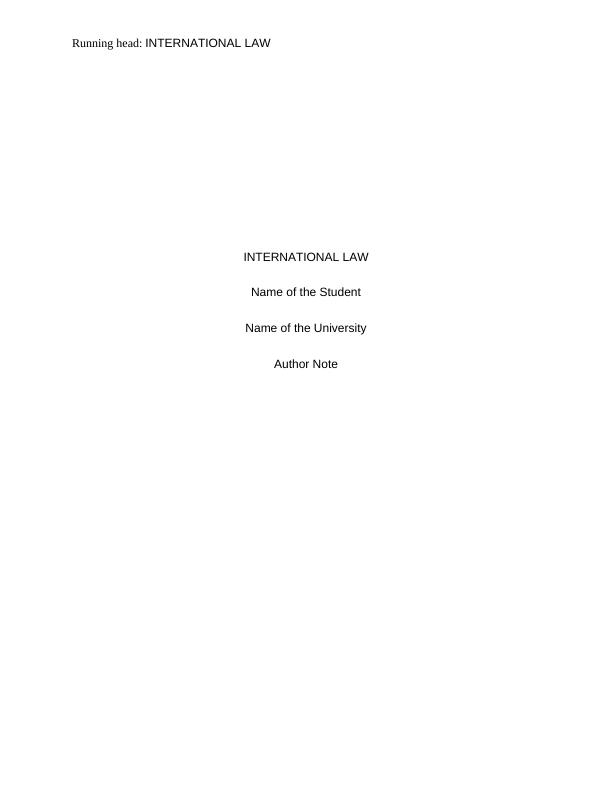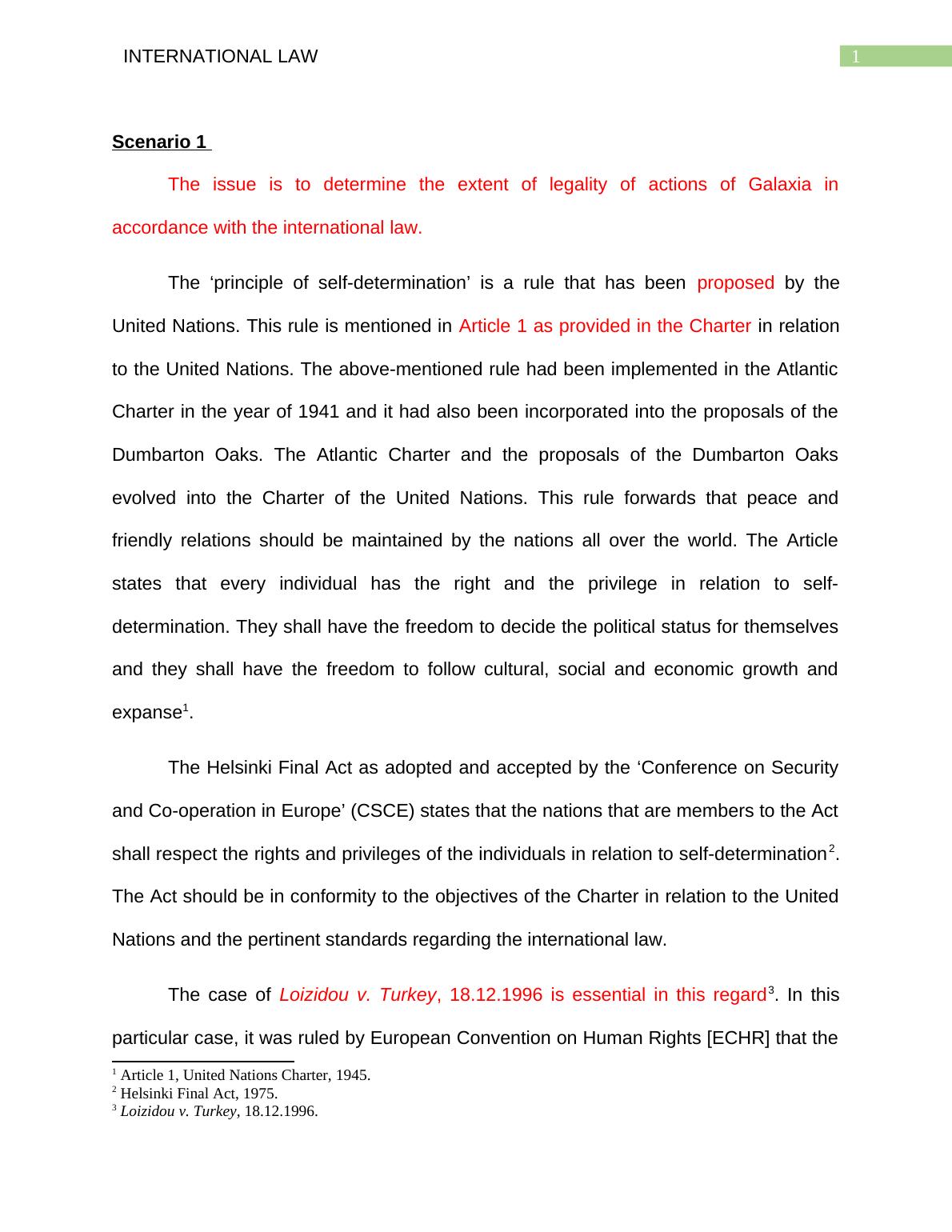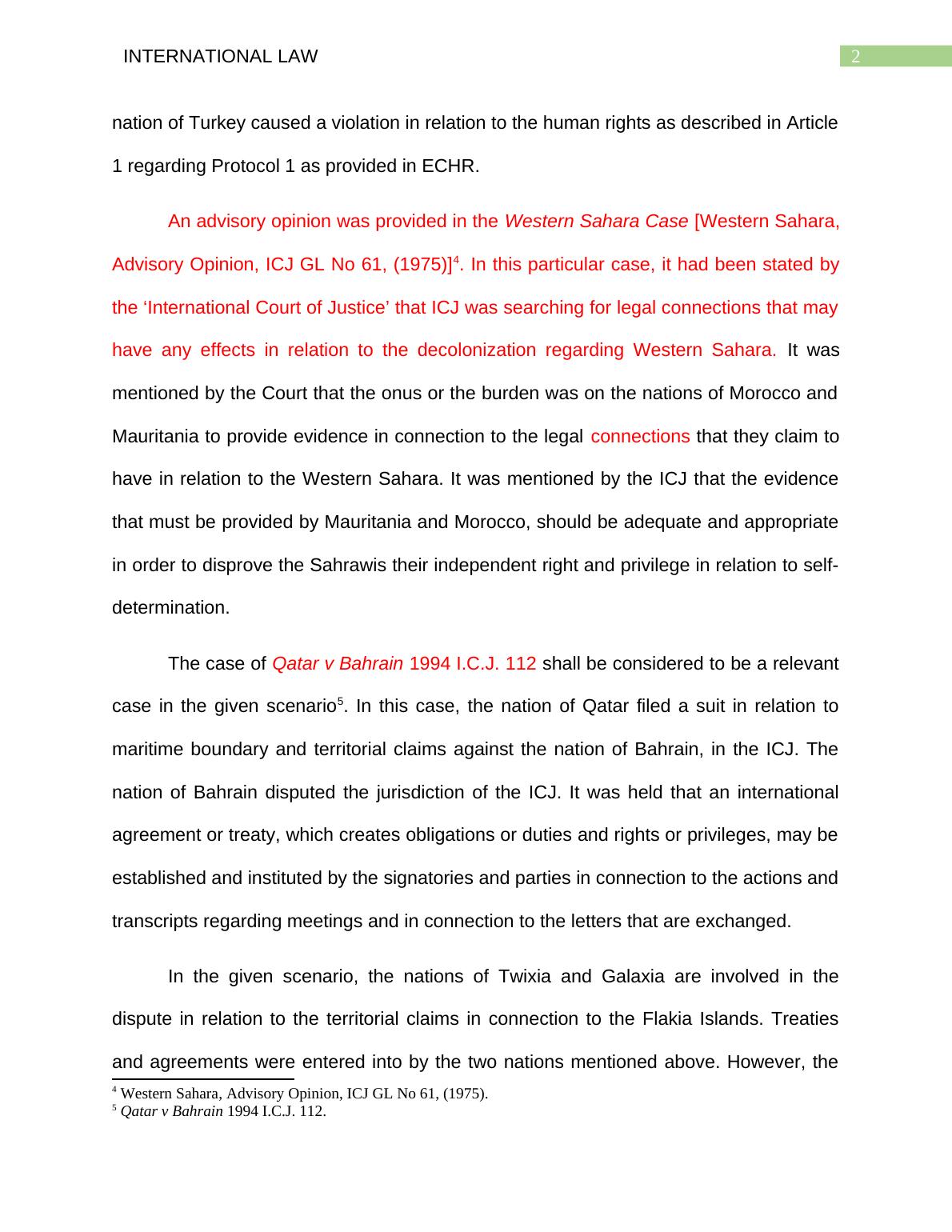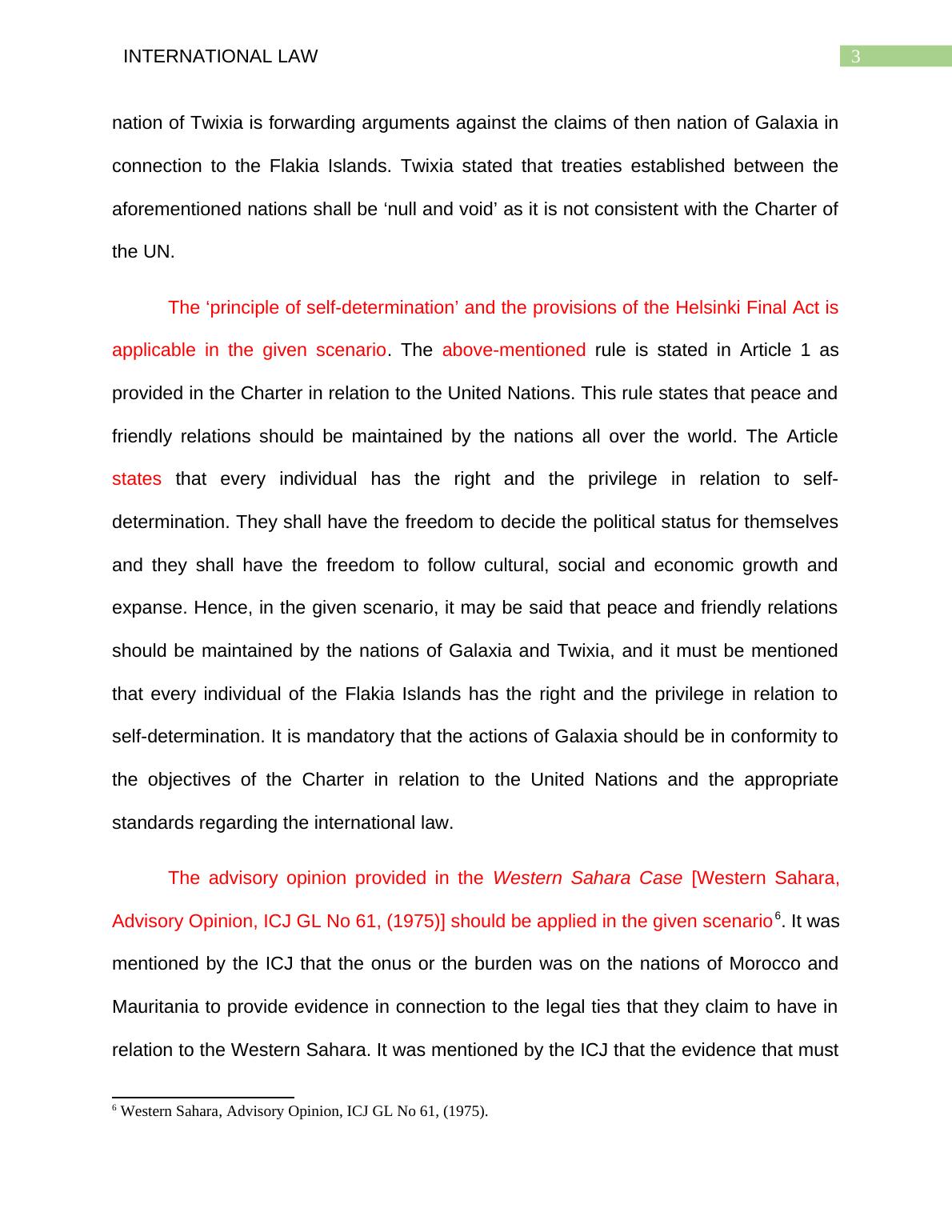Vienna Convention on the Law of Treaties
Added on 2022-08-23
14 Pages3496 Words15 Views
Running head: INTERNATIONAL LAW
INTERNATIONAL LAW
Name of the Student
Name of the University
Author Note
INTERNATIONAL LAW
Name of the Student
Name of the University
Author Note

INTERNATIONAL LAW1
Scenario 1
The issue is to determine the extent of legality of actions of Galaxia in
accordance with the international law.
The ‘principle of self-determination’ is a rule that has been proposed by the
United Nations. This rule is mentioned in Article 1 as provided in the Charter in relation
to the United Nations. The above-mentioned rule had been implemented in the Atlantic
Charter in the year of 1941 and it had also been incorporated into the proposals of the
Dumbarton Oaks. The Atlantic Charter and the proposals of the Dumbarton Oaks
evolved into the Charter of the United Nations. This rule forwards that peace and
friendly relations should be maintained by the nations all over the world. The Article
states that every individual has the right and the privilege in relation to self-
determination. They shall have the freedom to decide the political status for themselves
and they shall have the freedom to follow cultural, social and economic growth and
expanse1.
The Helsinki Final Act as adopted and accepted by the ‘Conference on Security
and Co-operation in Europe’ (CSCE) states that the nations that are members to the Act
shall respect the rights and privileges of the individuals in relation to self-determination2.
The Act should be in conformity to the objectives of the Charter in relation to the United
Nations and the pertinent standards regarding the international law.
The case of Loizidou v. Turkey, 18.12.1996 is essential in this regard3. In this
particular case, it was ruled by European Convention on Human Rights [ECHR] that the
1 Article 1, United Nations Charter, 1945.
2 Helsinki Final Act, 1975.
3 Loizidou v. Turkey, 18.12.1996.
Scenario 1
The issue is to determine the extent of legality of actions of Galaxia in
accordance with the international law.
The ‘principle of self-determination’ is a rule that has been proposed by the
United Nations. This rule is mentioned in Article 1 as provided in the Charter in relation
to the United Nations. The above-mentioned rule had been implemented in the Atlantic
Charter in the year of 1941 and it had also been incorporated into the proposals of the
Dumbarton Oaks. The Atlantic Charter and the proposals of the Dumbarton Oaks
evolved into the Charter of the United Nations. This rule forwards that peace and
friendly relations should be maintained by the nations all over the world. The Article
states that every individual has the right and the privilege in relation to self-
determination. They shall have the freedom to decide the political status for themselves
and they shall have the freedom to follow cultural, social and economic growth and
expanse1.
The Helsinki Final Act as adopted and accepted by the ‘Conference on Security
and Co-operation in Europe’ (CSCE) states that the nations that are members to the Act
shall respect the rights and privileges of the individuals in relation to self-determination2.
The Act should be in conformity to the objectives of the Charter in relation to the United
Nations and the pertinent standards regarding the international law.
The case of Loizidou v. Turkey, 18.12.1996 is essential in this regard3. In this
particular case, it was ruled by European Convention on Human Rights [ECHR] that the
1 Article 1, United Nations Charter, 1945.
2 Helsinki Final Act, 1975.
3 Loizidou v. Turkey, 18.12.1996.

INTERNATIONAL LAW2
nation of Turkey caused a violation in relation to the human rights as described in Article
1 regarding Protocol 1 as provided in ECHR.
An advisory opinion was provided in the Western Sahara Case [Western Sahara,
Advisory Opinion, ICJ GL No 61, (1975)]4. In this particular case, it had been stated by
the ‘International Court of Justice’ that ICJ was searching for legal connections that may
have any effects in relation to the decolonization regarding Western Sahara. It was
mentioned by the Court that the onus or the burden was on the nations of Morocco and
Mauritania to provide evidence in connection to the legal connections that they claim to
have in relation to the Western Sahara. It was mentioned by the ICJ that the evidence
that must be provided by Mauritania and Morocco, should be adequate and appropriate
in order to disprove the Sahrawis their independent right and privilege in relation to self-
determination.
The case of Qatar v Bahrain 1994 I.C.J. 112 shall be considered to be a relevant
case in the given scenario5. In this case, the nation of Qatar filed a suit in relation to
maritime boundary and territorial claims against the nation of Bahrain, in the ICJ. The
nation of Bahrain disputed the jurisdiction of the ICJ. It was held that an international
agreement or treaty, which creates obligations or duties and rights or privileges, may be
established and instituted by the signatories and parties in connection to the actions and
transcripts regarding meetings and in connection to the letters that are exchanged.
In the given scenario, the nations of Twixia and Galaxia are involved in the
dispute in relation to the territorial claims in connection to the Flakia Islands. Treaties
and agreements were entered into by the two nations mentioned above. However, the
4 Western Sahara, Advisory Opinion, ICJ GL No 61, (1975).
5 Qatar v Bahrain 1994 I.C.J. 112.
nation of Turkey caused a violation in relation to the human rights as described in Article
1 regarding Protocol 1 as provided in ECHR.
An advisory opinion was provided in the Western Sahara Case [Western Sahara,
Advisory Opinion, ICJ GL No 61, (1975)]4. In this particular case, it had been stated by
the ‘International Court of Justice’ that ICJ was searching for legal connections that may
have any effects in relation to the decolonization regarding Western Sahara. It was
mentioned by the Court that the onus or the burden was on the nations of Morocco and
Mauritania to provide evidence in connection to the legal connections that they claim to
have in relation to the Western Sahara. It was mentioned by the ICJ that the evidence
that must be provided by Mauritania and Morocco, should be adequate and appropriate
in order to disprove the Sahrawis their independent right and privilege in relation to self-
determination.
The case of Qatar v Bahrain 1994 I.C.J. 112 shall be considered to be a relevant
case in the given scenario5. In this case, the nation of Qatar filed a suit in relation to
maritime boundary and territorial claims against the nation of Bahrain, in the ICJ. The
nation of Bahrain disputed the jurisdiction of the ICJ. It was held that an international
agreement or treaty, which creates obligations or duties and rights or privileges, may be
established and instituted by the signatories and parties in connection to the actions and
transcripts regarding meetings and in connection to the letters that are exchanged.
In the given scenario, the nations of Twixia and Galaxia are involved in the
dispute in relation to the territorial claims in connection to the Flakia Islands. Treaties
and agreements were entered into by the two nations mentioned above. However, the
4 Western Sahara, Advisory Opinion, ICJ GL No 61, (1975).
5 Qatar v Bahrain 1994 I.C.J. 112.

INTERNATIONAL LAW3
nation of Twixia is forwarding arguments against the claims of then nation of Galaxia in
connection to the Flakia Islands. Twixia stated that treaties established between the
aforementioned nations shall be ‘null and void’ as it is not consistent with the Charter of
the UN.
The ‘principle of self-determination’ and the provisions of the Helsinki Final Act is
applicable in the given scenario. The above-mentioned rule is stated in Article 1 as
provided in the Charter in relation to the United Nations. This rule states that peace and
friendly relations should be maintained by the nations all over the world. The Article
states that every individual has the right and the privilege in relation to self-
determination. They shall have the freedom to decide the political status for themselves
and they shall have the freedom to follow cultural, social and economic growth and
expanse. Hence, in the given scenario, it may be said that peace and friendly relations
should be maintained by the nations of Galaxia and Twixia, and it must be mentioned
that every individual of the Flakia Islands has the right and the privilege in relation to
self-determination. It is mandatory that the actions of Galaxia should be in conformity to
the objectives of the Charter in relation to the United Nations and the appropriate
standards regarding the international law.
The advisory opinion provided in the Western Sahara Case [Western Sahara,
Advisory Opinion, ICJ GL No 61, (1975)] should be applied in the given scenario6. It was
mentioned by the ICJ that the onus or the burden was on the nations of Morocco and
Mauritania to provide evidence in connection to the legal ties that they claim to have in
relation to the Western Sahara. It was mentioned by the ICJ that the evidence that must
6 Western Sahara, Advisory Opinion, ICJ GL No 61, (1975).
nation of Twixia is forwarding arguments against the claims of then nation of Galaxia in
connection to the Flakia Islands. Twixia stated that treaties established between the
aforementioned nations shall be ‘null and void’ as it is not consistent with the Charter of
the UN.
The ‘principle of self-determination’ and the provisions of the Helsinki Final Act is
applicable in the given scenario. The above-mentioned rule is stated in Article 1 as
provided in the Charter in relation to the United Nations. This rule states that peace and
friendly relations should be maintained by the nations all over the world. The Article
states that every individual has the right and the privilege in relation to self-
determination. They shall have the freedom to decide the political status for themselves
and they shall have the freedom to follow cultural, social and economic growth and
expanse. Hence, in the given scenario, it may be said that peace and friendly relations
should be maintained by the nations of Galaxia and Twixia, and it must be mentioned
that every individual of the Flakia Islands has the right and the privilege in relation to
self-determination. It is mandatory that the actions of Galaxia should be in conformity to
the objectives of the Charter in relation to the United Nations and the appropriate
standards regarding the international law.
The advisory opinion provided in the Western Sahara Case [Western Sahara,
Advisory Opinion, ICJ GL No 61, (1975)] should be applied in the given scenario6. It was
mentioned by the ICJ that the onus or the burden was on the nations of Morocco and
Mauritania to provide evidence in connection to the legal ties that they claim to have in
relation to the Western Sahara. It was mentioned by the ICJ that the evidence that must
6 Western Sahara, Advisory Opinion, ICJ GL No 61, (1975).

End of preview
Want to access all the pages? Upload your documents or become a member.
